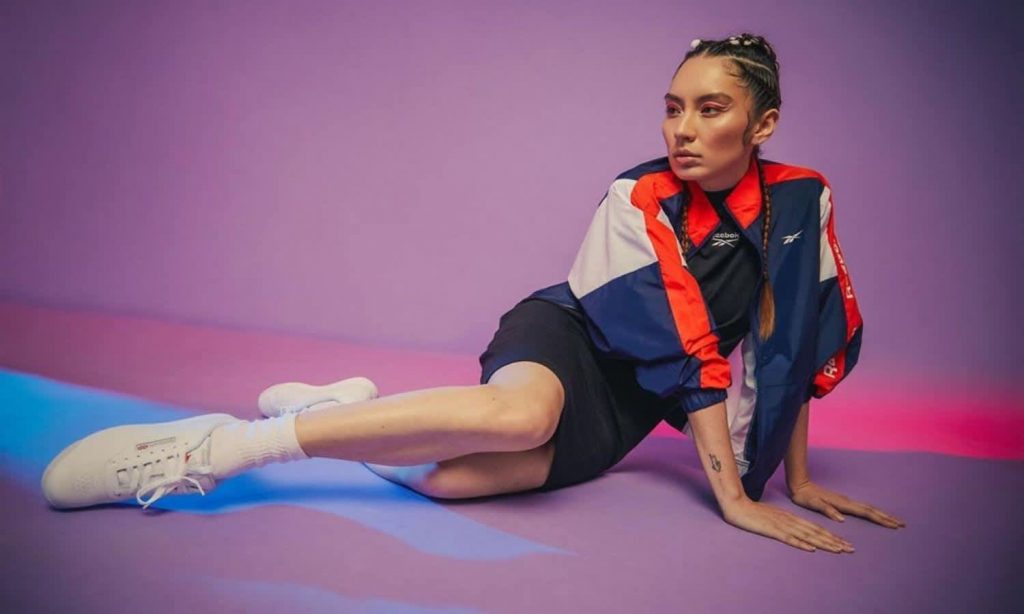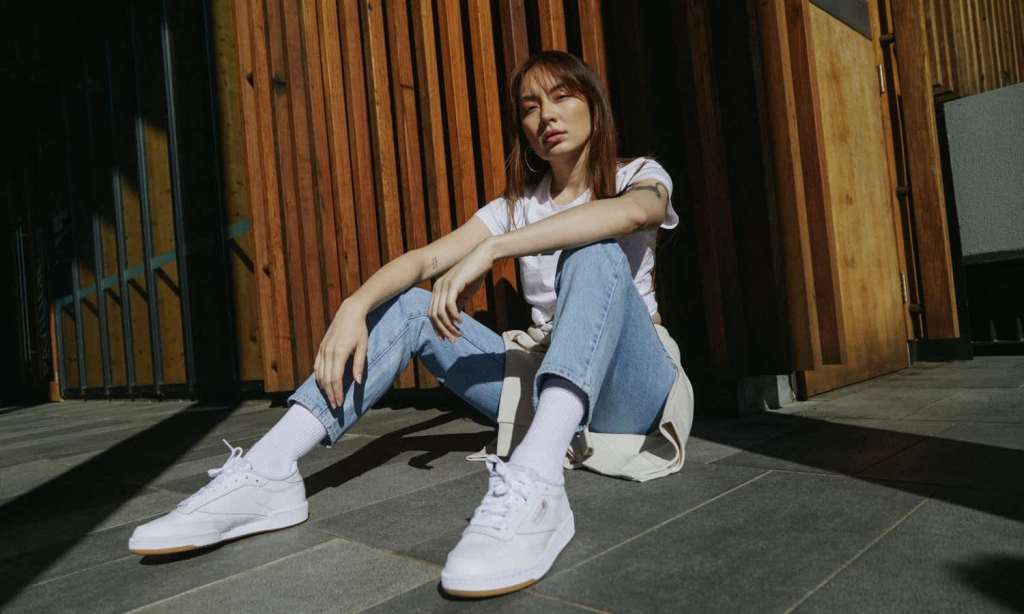Deena Lynch, AKA Jaguar Jonze has just released a new single, DeadAlive, and while for most artists that’s a feat in itself, Lynch’s story is much more extraordinary.
The newly named face of Reebok’s Not Your Princess campaign has just spent the last six months recovering from a COVID-19 diagnosis.
The global pandemic hit while Lynch was on tour in New York, leaving her and her band desperately trying to get a flight home. Once she made it back to Australia, she soon found out that she had brought a “souvenir” back with her.
The diagnosis led to 40 days in the hospital, a long and arduous recovery process and the courage to write a new song.
“For me, it was like a catharsis as well because there’s just so much uncertainty, anxiety, urgency and desperation,” she said in an interview with The Latch. “I got to channel that in the song and I finished recording it and writing it while I had COVID.”
Not only did the artist endure five straight weeks of fevers, but Lynch ticked “every single criteria box” including excruciating chest pains, dry cough, fatigue, shortness of breath, diarrhea, headaches and muscle aches and pains, however, the main residual was fatigue.
“I really battled with the fatigue because I just wasn’t used to having my livelihood taken away from me so drastically and so quickly and for such a long time as well.”
After receiving the all-clear and completing numerous quarantines, Lynch ventured back into the outside world, but was shocked at how differently people treated her.
Being in the early days of the pandemic, Lynch was hit with racism and the negative stigma surrounding the virus. “I was faced with a lot of ignorant questions because people were dealing with their own anxieties about the pandemic,” she said.
“Communication and information about the virus wasn’t transparent at that time, so people wanted to pass off their anxieties on to me who was a confirmed COVID-19 patient. I got questions like; ‘Did the rest of the band avoid getting COVID-19 but you did because you are Asian?’ They wanted to find a reason to protect themselves from the virus.”
Here, Lynch talks to The Latch about how she dealt with her mental health in that time, why the Reebok campaign is so important to her, and gives a message to the people of Australia about COVID-19.
Anita Anabel: Hi Deena, thank you so much for taking the time to chat with me today. You’re the new face of Reebok. What an accomplishment! How does that feel? It’s got to feel pretty amazing.
Deena Lynch: It’s actually pretty surreal. When it came through I actually thought it was never going to happen, but when it did, I was so honoured because it’s a campaign that has its own history and its own movement as well and to be a part of that and to be recognised for that is truly an honour.
AA: The Not Your Princess campaign is such a great initiative. Why is important for you to be a part of something like this?
DL: I think it’s really important because it’s about defining your own success and breaking out of your own — as well as cultural or societal constructs — to pave your own path to your artistry, to your career, to how you want to live your life, and how you want to conduct yourself as a female in society.
I feel like that just really ties in well with what I’m trying to do personally in my own life and in my own artistry as well.
AA: You just released a new single, DeadAlive, and I am told that you not only wrote it during the global pandemic but even wrote it while you had COVID yourself. What was the process like and how did you find the strength?
DL: I first started writing the song when the band and I were locked down in New York. We were in New York for our very first US tour and then the COVID lockdown happened and we were stuck in the apartment for a week as we tried to find flights to get out back home to Australia. So I started writing it there.
Then, when I came home from the US, I brought back a souvenir with me — COVID-19 —which then put me into hospital care for the next 40 days.
It gave me a lot of time to finish writing this song and I think that for me it was like a catharsis as well, because there’s just so much uncertainty, anxiety, urgency and desperation. I got to channel that in the song and finished recording it and writing it while I had COVID.
At the time, I was really insecure about how it was sounding because I didn’t have my health or my voice. But after some time, I just decided to leave it because I think it just encapsulated what that moment was for me.
“Then when I came home from the US, I brought back a souvenir with me — COVID-19 —which then put me into hospital care for the next 40 days.”
AA: I am so sorry you went through such an ordeal, even contracting COVID. How did the illness manifest for you and are there any residual effects?
DL: I had five straight weeks of a fever. When you have a fever for five weeks, you’re just delirious.
I ticked every single criteria box. Excruciating chest pains, dry cough, fatigue, shortness of breath, diarrhea, headaches, muscle aches and pains, but the main residual effect has been fatigue.
Also, after lying down, being bedridden for seven weeks, I had Muscle atrophy [Muscle atrophy is when muscles waste away]. So I had to rebuild my strength to be able to just like stand up for more than 10 minutes a day and I’ve worked really hard this year to try and beat that fatigue and also get my strength back. I’ve been exercising a little bit every single day.
I really battled with the fatigue though because I just wasn’t used to having my livelihood taken away from me so drastically and so quickly and for such a long time as well.
It’s almost like I’ve been slapped in the face with the fact that I was taking my health for granted. I need to prioritise self-care, exercise and eat well and rest. But, I feel like I’m better now than I was prior to having COVID.
“I really battled with the fatigue though because I just wasn’t used to having my livelihood taken away from me so drastically and so quickly and for a long time as well.”

AA: Has it affected your singing ability at all?
DL: We’ll see when I go on tour next month [November]. Initially, I could not play. I could not pick up the guitar, I had no strength for the first few months.
I was also a part of like this medical research team amongst the board of doctors. I was just a COVID-19 patient. But when you are amongst that research, and just constantly being told about like lung fibrosis, and sepsis, and organ failure, and long term effects of shortness of breath — and they didn’t know much about the virus at the time — I was actually so worried that I might not even get my voice back, my energy back, and that I would never be able to be the same level of a musician than I was. I’m really grateful though because I don’t feel that way now.
I did have my first show with my band in September — which was six months later —and it was three or four shows in one day. I did struggle so much with that. I almost collapsed with fatigue, but I feel like it’s something I just have to rebuild slowly.
AA: It took it’s toll physically, but I can imagine that must have also taken a mental toll as well. How did the diagnosis affect your mental health?
DL: When you’re that sick, it’s the time you really want to lean on your family and friends. It’s one of those situations where you can’t see them because you can’t make them ill and they also don’t have access to where you are trying to recover.
Seven weeks of being in solitary confinement was super hard on my mental health, while also battling like the uncertainty of my health, plus the devastation of my industry and my career for this year.
Just even grieving over the fact that my plans for 2020 just fell apart and I financially lost a lot as well. All of that was just so anxiety-inducing. It took me until August this year to actually be able to come back home to Queensland and see my family and my friends.
After going through the hospital, doing the hotel quarantine again, that added a lot of stress to my mental health, but I’m really grateful. I’m really thankful that I and my mental health journey has been a long-term relationship over the last few years. I have the tools and techniques that I need to manage those ups and downs.
I feel like I was a lot more equipped to deal with 2020 and COVID than if I was to have COVID happen to me a few years ago. I feel like it also gave me the opportunity to have a relationship with myself, which allowed me to face things that I didn’t know I had to face.
AA: When you were finally able to come home, what was that experience like?
DL: I didn’t tell anyone because all I wanted to do was spend time with my mum and my dog.
The other side of my mental health was that I also felt a lot of social anxiety after coming out of solitary confinement. I felt like everyone was looking at me and being like, “why is she outside?”
I was in the media a lot as the COVID 20-something-year-old demographic poster girl so I felt like people would be looking at me and thinking, “Oh, that’s the COVID chick”. I had to ease myself back into society and just get used to even being around people and doing everyday things, like going grocery shopping. I took my time with it, and slowly got back into my own system.
“I was in the media a lot as the COVID 20-something-year-old demographic poster girl so I felt like people would be looking at me and thinking, “oh, that’s the COVID chick”.”

AA: That’s such an interesting point you make about others perception of you after COVID. Did people treat you differently?
DL: Yes, totally, but I would say less so now. When it was the early days in March, there weren’t many cases around Australia. There was actually a lot of racism and stigma around COVID-19 and I’m half Asian.
I was faced with a lot of ignorant questions because people were dealing with their own anxieties about the pandemic. Communication and information about the virus wasn’t transparent at the time so people wanted to pass off their anxieties onto me, who was a confirmed COVID-19 patient.
I got questions like; “Did the rest of the band avoid getting COVID-19 but you did because you are Asian?”. They wanted to find a reason to protect themselves from the virus. They were ignorantly being racist because they were very scared themselves. I understand completely how people would feel but I just wished they would be more careful around how they communicated that to me.
“I got questions like; “Did the rest of the band avoid getting COVID-19 but you did because you are Asian?” They wanted to find a reason to protect themselves from the virus.”
AA: What do you want people to know about the virus even though it seems as though we are coming out the other end?
DL: I know that we’re going through a really hard time right now with isolation and quarantining and having our lifestyles and livelihoods taken from us in a drastic way.
But I just want to push the message that those measures help us, in the long run, to save you from yourself or the health of your loved ones being affected in a long-term way. I know it’s really hard, but there’s a reason why we’re doing it.
Secondly, we don’t choose to have the virus. It’s not like something that people opt into, so it’s important to be careful about the stigmas surrounding that.
AA: You’ve been through quite the journey and have really picked yourself up and gotten to the other side. What type of role model do you want to be for the younger generation?
DL: I really want to push the message that resilience and fortitude will get us places, and so no matter what adversity comes your way, if you always display resilience and fortitude, you will be able to turn the tide on your own life. You will be able to take back the power and control of your own life and direct it to where you want to go.
No matter where you come from, and what you know, privileges you had or didn’t have or what disadvantaged backgrounds you came from, I think there’s an opportunity in there for everyone.
It might be harder to carve out those paths, but you will have your own story. If you keep pushing through that, that story is what people will connect with.
Global fitness and lifestyle leader Reebok have united with Australian artists, Deena Lynch (aka Jaguar Jonze), Becca Hatch and Tarah Jane Scott on their powerful new campaign, Not Your Princess. The campaign celebrates female strength and unapologetic confidence, to relaunch Reebok’s iconic Princess franchise.
Find out more here.
—







